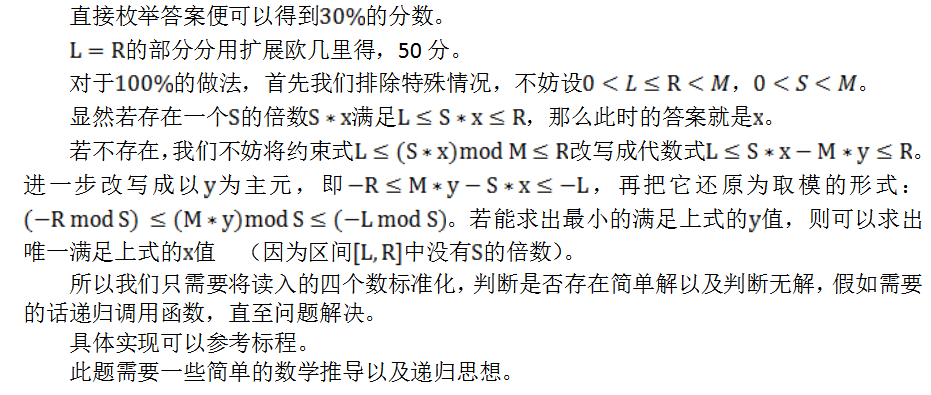不等式
Time Limit: 10 Sec Memory Limit: 128 MB
Description
小z热衷于数学。
今天数学课的内容是解不等式:L<=Sx<=R 。小z心想这也太简单了,不禁陷入了深深的思考:假如已知L,R,S,M ,满足L<=(Sx) mod M<=R 的最小正整数x该怎么求呢?
第一行包含一个整数T,表示数据组数,接下来是T行,每行为四个正整数M, S, L, R 。
Output
对于每组数据,输出满足要求的x值,若不存在,输出-1 。
1
5 4 2 3
Sample Output
2
HINT
30%的数据中保证有解并且答案小于等于10^6;
另外20%的数据中保证L=R;
100%的数据中T<=100,M, S, L, R<=10^9。
Solution

Code
1
2
3
4
5
6
7
8
9
10
11
12
13
14
15
16
17
18
19
20
21
22
23
24
25
26
27
28
29
30
31
32
33
34
35
36
37
38
39
40
41
42
43
44
45
46
47
48
49
| #include<bits/stdc++.h>
using namespace std;
typedef long long s64;
const int ONE = 300005;
const int MOD = 1e9 + 7;
int T;
s64 M, S, L, R;
int get()
{
int res=1,Q=1;char c;
while( (c=getchar())<48 || c>57 )
if(c=='-')Q=-1;
res=c-48;
while( (c=getchar())>=48 && c<=57 )
res=res*10+c-48;
return res*Q;
}
s64 Dfs(s64 M, s64 S, s64 L, s64 R)
{
if(L > R || M < L) return -1;
S %= M;
int res = (L - 1)/S + 1;
if(res * S <= R) return res;
int l = (-R % S + S) % S, r = (-L % S + S) % S;
int y = Dfs(S, M, l , r); if(y == -1) return -1;
int x = (R + M * y) / S;
if(L <= S * x - M * y) return x;
return -1;
}
int main()
{
T = get();
while(T--)
{
M = get(); S = get();
L = get(); R = get();
printf("%d\n", Dfs(M, S, L, min(R, M-1)));
}
}
|

